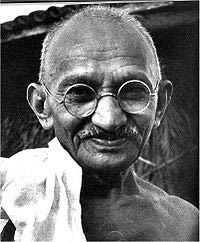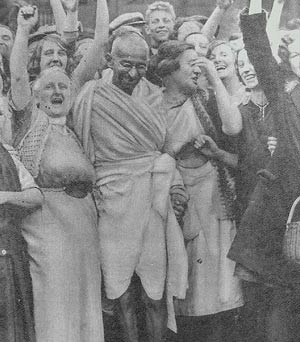 |
| source - google |
View this biography in Hindi on YouTube
Don't wanna read full article? Well we have the solution for this.
Now you can watch this biography on YouTube.
Biography
Mahatma Gandhi was an unmistakable Indian political pioneer who crusaded for Indian freedom. He utilized peaceful standards and tranquil rebellion. He was killed in 1948, not long after accomplishing his labor of love of Indian autonomy. In India, he is known as 'Father of the Nation'.
Short Biography of Mahatma Gandhi
Mohandas K. Gandhi was conceived in 1869, in Porbandar, India. Mohandas was from the social cast of tradesmen. His mom was unskilled, yet her presence of mind and religious dedication lastingly affected Gandhi's character. As a youth, Mohandas was a decent understudy, yet the modest young man showed no indications of administration. On the demise of his dad, Mohandas flew out to England to pick up a degree in law. He ended up included with the Vegetarian Society and was once requested to interpret the Hindu Bhagavad Gita. This great of Hindu writing stirred in Gandhi a feeling of pride in the Indian sacred texts, of which the Gitawas the pearl.
Around this time, he additionally contemplated the Bible and was struck by the lessons of Jesus Christ – particularly the accentuation on lowliness and absolution. He stayed focused on the Bible and Bhagavad Gita for the duration of his life, however he was disparaging of parts of the two religions.
Gandhi in South Africa
On finishing his degree in Law, Gandhi came back to India, where he was before long sent to South Africa to provide legal counsel. In South Africa, Gandhi was struck by the level of racial separation and treachery regularly experienced by Indians. It was in South Africa that Gandhi initially explored different avenues regarding efforts of common noncompliance and challenge; he called his peaceful dissents satyagraha. Regardless of being detained for brief timeframes, he additionally upheld the British under specific conditions. He was enriched by the British for his endeavors amid the Boer War and Zulu defiance.
"When I give up, I recall that all through history the methods for truth and love have constantly won. There have been despots, and killers, and for a period they can appear to be strong, yet at last they generally fall. Consider it– dependably."
– Gandhi
Short Biography of Mahatma Gandhi
 |
| source - google |
Mohandas K. Gandhi was conceived in 1869, in Porbandar, India. Mohandas was from the social cast of tradesmen. His mom was unskilled, yet her presence of mind and religious dedication lastingly affected Gandhi's character. As a youth, Mohandas was a decent understudy, yet the modest young man showed no indications of administration. On the demise of his dad, Mohandas flew out to England to pick up a degree in law. He ended up included with the Vegetarian Society and was once requested to interpret the Hindu Bhagavad Gita. This great of Hindu writing stirred in Gandhi a feeling of pride in the Indian sacred texts, of which the Gitawas the pearl.
Around this time, he additionally contemplated the Bible and was struck by the lessons of Jesus Christ – particularly the accentuation on lowliness and absolution. He stayed focused on the Bible and Bhagavad Gita for the duration of his life, however he was disparaging of parts of the two religions.
Gandhi in South Africa
On finishing his degree in Law, Gandhi came back to India, where he was before long sent to South Africa to provide legal counsel. In South Africa, Gandhi was struck by the level of racial separation and treachery regularly experienced by Indians. It was in South Africa that Gandhi initially explored different avenues regarding efforts of common noncompliance and challenge; he called his peaceful dissents satyagraha. Regardless of being detained for brief timeframes, he additionally upheld the British under specific conditions. He was enriched by the British for his endeavors amid the Boer War and Zulu defiance.
Gandhi and Indian Independence
 |
| source - google |
Following 21 years in South Africa, Gandhi came back to India in 1915. He turned into the pioneer of the Indian patriot development battling for home govern or Swaraj.
Gandhi effectively affected a progression of peaceful dissent. This included national strikes for a couple of days. The British looked to boycott restriction, yet the idea of peaceful challenge and strikes made it hard to counter.
Gandhi additionally urged his supporters to rehearse inward control to prepare for autonomy. Gandhi said the Indians needed to demonstrate they were meriting autonomy. This is as opposed to freedom pioneers, for example, Aurobindo Ghose, who contended that Indian autonomy was not about whether India would offer better or more awful government, however that it was simply the privilege for India to have government.
Gandhi additionally conflicted with others in the Indian autonomy development, for example, Subhas Chandra Bose who upheld guide activity to oust the British.
Gandhi as often as possible canceled strikes and peaceful challenge in the event that he heard individuals were revolting or viciousness was included.
In 1930, Gandhi drove a well known walk to the ocean in dissent at the new Salt Acts. In the ocean, they made their own salt, infringing upon British controls. A large number were captured and Indian correctional facilites were brimming with Indian freedom devotees.
In any case, while the crusade was at its pinnacle some Indian dissidents slaughtered some British regular citizens, and subsequently, Gandhi canceled the freedom development saying that India was not prepared. This broke the core of numerous Indians focused on autonomy. It prompted radicals like Bhagat Singh carrying on the crusade for autonomy, which was especially solid in Bengal.
Gandhi and the Partition of India
After the war, Britain demonstrated that they would give India freedom. In any case, with the help of the Muslims driven by Jinnah, the British intended to parcel India into two: India and Pakistan. Ideologically Gandhi was against segment. He worked enthusiastically to demonstrate that Muslims and Hindus could live respectively calmly. At his supplication gatherings, Muslim petitions were perused out close by Hindu and Christian supplications. In any case, Gandhi consented to the parcel and spent the day of Independence in supplication grieving the segment. Indeed, even Gandhi's fasts and advances were lacking to keep the influx of partisan brutality and executing that took after the segment.
Far from the governmental issues of Indian autonomy, Gandhi was brutally disparaging of the Hindu Caste framework. Specifically, he denounced against the 'unapproachable' station, who were dealt with appallingly by society. He propelled numerous crusades to change the status of untouchables. Despite the fact that his battles were met with much obstruction, they went far to evolving extremely old partialities.
At 78 years old, Gandhi attempted another quick to attempt and keep the partisan murdering. Following 5 days, the pioneers consented to quit killing. Yet, after ten days Gandhi was shot dead by a Hindu Brahmin restricted to Gandhi's help for Muslims and the untouchables.
Gandhi and Religion
Gandhi was a searcher of reality.
"In the disposition of quietness the spirit finds the way in a clearer light, and what is slippery and tricky purposes itself into precious stone clearness. Our life is a long and exhausting mission after Truth."– Gandhi
Gandhi said his awesome point in life was to have a dream of God. He tried to love God and advance religious comprehension. He looked for motivation from a wide range of religions: Jainism, Islam, Christianity, Hinduism, Buddhism and joined them into his own particular logic.
On a few events, he utilized religious practices and fasting as a feature of his political methodology. Gandhi felt that individual model could impact popular supposition.
"At the point when each expectation is gone, 'when partners come up short and solaces escape,' I find that assistance arrives by one means or another, from I know not where. Supplication, revere, petition are no superstition; they are acts more genuine than the demonstrations of eating, drinking, sitting or strolling. It is no misrepresentation to state that only they are genuine, all else is incredible."
– Gandhi Autobiography – The Story of My Experiments with Truth
Facts
- Mahatma Gandhi was born as Mohandas Karamchand Gandhi. The honorific title Mahatma, or "Awesome Soul," was given to him in 1914.
- Gandhi is frequently called Bapu in India, a pet name that signifies "father."
- Gandhi battled for considerably more than autonomy. His causes included social liberties for ladies, the abrogation of the standing framework, and the reasonable treatment surprisingly paying little mind to religion.
- Gandhi requested reasonable treatment for the untouchables, India's most minimal rank, and he experienced a few fasts to help the reason. He called the untouchables harijans,which signifies "offspring of God."
- Gandhi ate natural product, nuts, and seeds for a long time yet changed back to strict vegetarianism in the wake of agony medical issues.
- Gandhi took an early promise to maintain a strategic distance from drain items, be that as it may, after his well being started to decay, he yielded and began drinking goat's drain. He in some cases headed out with his goat to guarantee that the drain was new and that he wasn't given bovine or wild ox drain.
- Government nutritionists were brought in to clarify how Gandhi could go 21 days without sustenance.
- No official photographs of Gandhi were permitted while Gandhi was fasting, because of a paranoid fear of further powering the push for autonomy.
- Gandhi was really a philosophical revolutionary and needed no settled government in India. He felt that if everybody received peacefulness they could act naturally overseeing.
- Mahatma Gandhi's most straightforward political commentator was Winston Churchill.
Merchandise
Posters
Books





0 Comments